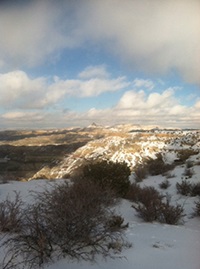Topics: Teachers College, Awards
January 29, 2016

Conner Edwards' college experiences include volunteering for
Best Buddies, serving as president of the Student Council for Exceptional
Children, student teaching in the Navajo Nation and more. Because of these
contributions, the Council for Exceptional Children named him the Outstanding
Undergraduate Student of the Year.
Conner Edwards learned in early January that he would receive a national award recognizing years of helping people with disabilities on top of his stellar classroom performance. Yet weeks later, he still hadn’t processed the significance of the honor.
That’s because—in a manner becoming of the Council for Exceptional Children’s Outstanding Undergraduate Student of the Year—the senior has been too busy to celebrate as he works and lives with children in the Navajo Nation.
“I’m definitely honored. Honestly, though, I didn’t really put that much thought into it afterward,” he said with a chuckle. “My schedule is pretty much 7 a.m. to 9 p.m. with the kids. Then I stay up for one or two hours doing homework. Then I do it all the next day.”
Edwards, who is majoring in special education for intense interventions in Ball State’s Teachers College, is student teaching at Dzilth-Na-O-Dith-Hle Community Grant School in Bloomfield, New Mexico.
He spends his days rotating among third-, fifth-, seventh- and eighth-grade classrooms, working with close to 30 special needs students. In the evenings, he returns to a dormitory, where he tutors and takes care of about 70 students. At the end of February, he will shift to Bloomfield High School, where he will finish his student teaching.
The experience in the Navajo Nation will cap off a college career packed with volunteer work and leadership roles.
To highlight a couple, he is president of the Ball State chapter of the Student Council for Exceptional Children, which aims to improve educational outcomes for people with special needs. He has also spent years volunteering for Best Buddies, which pairs college students as mentors and friends with people who have disabilities and live in the community.
“It’s so hard to put how he stands out into words,” said Lisa Pufpaff, an associate professor of special education, who nominated Edwards for the CEC award.
“It’s one of those ‘You know it when you see it’ kind of things. To me, it’s a combination of maturity, intellect and absolute passion for his chosen career.”
Groups grow under Edwards’ leadership
When Pufpaff met Edwards, he was a high school junior visiting campus and already able to speak about special education and disabilities with an air of authority. He had a few years’ experience in the field as a volunteer for Best Buddies, which inspired him to study special education.
“He's like a magnet. They're just drawn to him. He's fun. You often don't find that dynamic in someone who's so intelligent and so mature and yet still fun and relates to so many different groups.”
— Lisa Pufpaff
associate professor of special education
“It’s just a simple concept of being a friend to someone,” he said. “You go in with this attitude of ‘Oh I’m going to be such a great friend.’ But I’ve learned so much more from my pairings than they’ve learned from me.”
He continued with the organization after coming to Ball State. As part of the executive team, he helped the group partner with other host sites, making it the largest chapter in the state.
He has also given his time the past two years to the adult services program Beyond I Can in addition to boosting the university’s chapter of CEC. Under his leadership, the student group has seen meeting attendance increase four- or five-fold, Pufpaff said.
“He’s like a magnet,” she said. “They’re just drawn to him. He’s fun. You often don’t find that dynamic in someone who’s so intelligent and so mature and yet still fun and relates to so many different groups.”
In the heart of the Navajo Nation
Life has a different pace for Edwards in his temporary home in New Mexico.
“I love it so far,” he said during a phone call on a recent Sunday, one of two days a week he’s not spending almost all waking hours with his students.
“I really like living with the kids. I get to see two different sides of them—the academic side during the day, then you get to know them on a personal level.”

Photo by Conner Edwards
Angel Peak is south of Bloomfield, New Mexico, where Edwards works and lives with children from the Navajo Nation.
The students come from families spread across hundreds of miles in a reservation that reports poverty levels ranging from 30 to 50 percent. The experience has given him a new perspective on children who live in poverty—not just how it affects them in the classroom but through all aspects of their lives.
“You definitely connect well with kids in the classroom, and you can be friendly. But at the end of the day, your job is to teach them,” he said. “I love having the ability to come back here to my home, essentially, and I get to spend another six hours with them.
“It’s just simple downtime that can lead to the funniest jokes or simplest conversations. You learn a lot more about them, about their families and their homes. You get to be more of a friend, a role model.”
Council for Exceptional Children award
Edwards’ student teaching experience will round out his degree and licensing requirements. He plans to teach in Indiana for a few years then return to school for a master’s degree.
Before collecting his diploma this spring, he’s set to receive his honor from the CEC during its annual awards ceremony in mid-April. The international organization recognizes only one undergraduate each year.
Denise Whitford, chairperson of the CEC Student Committee, says the council chose Edwards because his “dedication to special education, especially his work with his fellow students and faculty, fostering relationships with other universities, and of course his commitment to children with exceptionalities and their families makes him an excellent recipient for this year’s award.”
 Passionate about teaching?
Passionate about teaching?
Ball State is the place for future teachers. Study elementary education, special education, educational studies, educational psychology, educational leadership or counseling psychology and guidance services.
See the Teachers College's programs.
By Dan Human, Content Strategist